Inequality 2
The Virus of Inequality

The virus of inequality or inequality in the virus
Two reports warn of a truth, the deadly Covid-19 pandemic has increased inequities and global differences and although anyone can get sick, those with lower incomes add up much more in the statistics, are poorer and will have less access to the hopeful vaccine …
Author: Juana Carrasco Martin

Translated and edited by Walter Lippmann for CubaNews.
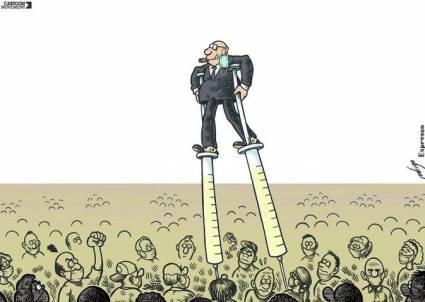
The combined wealth of ten of the world’s richest people could pay for vaccines to immunize everyone Author: Twitter Published: 02/02/2021 | 03:38 pm
Oxfam has been adamant that the combined wealth of the world’s ten richest people could pay for vaccines to immunize the entire world. At the same time, the International Labor Organization stated in a report that the Covid-19 pandemic has caused the loss of 255 million jobs.
Social inequity, unequal opportunities to access goods and services such as housing, education or health are among the consequences of the world’s health situation, where more than 103 million people have fallen ill and more than two million have died, and the count continues, while the vaccines already in use, which are not enough and are the object of disputes between first world countries that can afford them and are among their manufacturers, do not seem to be distributed fairly….
Those who have called it the virus of inequality are right. Here are some data that prove it.
The Oxfam report is titled “The Inequality Virus: Reuniting a coronavirus-torn world through a fair, just and sustainable economy,” and it announces all that it means and is needed.
Paul O’Brien, vice president of Oxfam America, in an interview with Democracy Now, noted of the pandemic situation: “The 10 richest people ended up making half a trillion dollars during the pandemic. The richest thousand got back all the money they lost in the pandemic, and they reached the same level of wealth in nine months. But at the same time, it has been disastrous for people at the extreme end of poverty.”
The report of this international confederation of 19 non-governmental organizations, which carry out humanitarian work in 90 countries under the slogan “working with others to combat poverty and suffering”, as they describe it on the Internet, warns that in the face of these exorbitant profits of billionaires, poor people will not recover from the economic and health crisis for at least a decade. If it does, it should be noted.
“In every country we looked at, inequality has worsened during the pandemic,” O’Brien added.
The Economic Commission for Latin America and the Caribbean (ECLAC) pointed out that this economic crisis and the slow exit from it will lead to the closure of 2.7 million companies in the region alone and some 8.5 million more workers will lose their jobs, in an emergency that by 2020 had already led to a significant drop in growth and economic contraction.
The economic recovery will be fragile and uneven, is the sharp forecast of ECLAC; the painful conclusion for millions of Latin Americans and Caribbeans who were already going through a limited growth, to which now add the consequences of the pandemic as the lower export of raw materials and the collapse of tourism, among other indices in decline.
ECLAC’s Executive Secretary, Alicia Bárcena, added other significant data in red: 54 percent of the region’s labor force does not have social protection or access to public health services.
Of this proportion, 57 percent are women, and this index added an aggravating factor that is reproduced in other regions of the world, even in developed countries. The International Labor Organization also brought its concerns to the 51st World Economic Forum in Davos, which met virtually this week and not in its usual snowy retreat in the Swiss Alps.
Globally, the pandemic cost workers $3.7 trillion in lost income and the destruction of the equivalent of 255 million jobs in 2020, four times the impact of the 2009 global financial crisis, the ILO reported.
But the summit meeting of politicians, businessmen and representatives of social and cultural organizations, which this time did not take place as usual in Thomas Mann’s Magic Mountain, did not exactly provide prodigious solutions at a peremptory moment for the planet. On the contrary, the widespread resurgence of the coronavirus, and even the new strains, highlighted the old weaknesses of health systems around the world, the injustices, the inaccessibility to medical care and vaccination that should be for everyone.
The slogan “The Great Reset” was crushed by an avalanche, and in this January 2021, as in the novel of the great writer, the problems discussed at the Davos Forum and the lack of intention to address them from what is fair, can be seen as the decadence of a way of life where the selfishness of those who only count profits in their finances over world health takes precedence.
The pandemic is conjunctural, although of extreme gravity. That is why its combination with structural problems, the same ones year after year, multiply the effects of inequity.
Check it out in these statements by Ursula von der Leyen, president of the European Commission, when the bloc intensified stricter monitoring of vaccine exports to countries outside the union. This is the case of the United Kingdom, because they had invested billions of euros and that “companies must now deliver” their vaccines to the 27 member states. “… We will set up a transparency mechanism for vaccine exports. Europe is determined to contribute. But it also means business.”
Ultimately that is the transparent truth,. The EU is a union of high-income rich countries, home to 342 billionaires; however, 123 million people at risk of poverty also reside there, Oxfam reported.
So what should we leave for the always neglected Africa? Cyril Ramaphosa, president of the African Union and of South Africa – one of the countries most affected by the coronavirus and even contributing a new strain, apparently of greater spread and lethality -, during his speaks at the 51st edition of the Davos Economic Forum, rightly criticized what he defined as “vaccine nationalism”, that is, the implementation of this selfish and inhuman attitude of hoarding, which hinders an equitable distribution of vaccines. “The rich countries of the world went out and acquired large doses (…) Some even acquired up to four times more than what their population needs excluding other countries”, a denunciation that he joined to the substantial comment: an increase in poverty is “expected for the first time in decades” and added, “the challenges we face were not created by the virus, they were created by us”.
You and I are not “us”, it is clear who fall into that category in the current pandemic and in the ancestral ills of that continent, the most powerful nations of the world that were colonial or neo-colonial empires.
The AFP news agency commented in this regard that bilateral agreements between governments and companies manufacturing vaccines against the Covid-19 virus could raise the prices of the drug and limit its supply to some regions.
Of course, the EU is not alone in this hoarding, where the United States and Donald Trump’s promise-threat that his country would be the first to be immunized and the willingness to buy all the vaccines produced in the world takes the lead.
Ramaphosa ratified the necessary denunciation: “We are concerned about vaccine nationalism (…) The rich countries of the world are holding on to these vaccines and we say: release the excess vaccines you have ordered and stockpiled”.
Reuters reported these days that the United Kingdom ordered 367 million doses of seven different vaccines for its population of approximately 67 million inhabitants, and the European Union secured almost 2.3 billion doses for a population of 450 million inhabitants.
However, the African continent, with some 1.3 billion inhabitants, barely completed 600 million doses of the international vaccine Covax, under the aegis of the WHO, which is also being requested by the rich countries.
We are faced with the confirmed presence of inequality in the midst of the terrible coronavirus.
Vaccination against selfishness and inequality

Vaccination against selfishness and inequality
By: Randy Alonso Falcón
January 27, 2021
Translated and edited by Walter Lippmann for CubaNews.
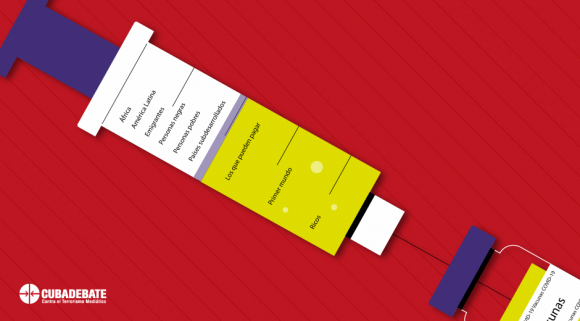 “It will not be an exhausted and outdated world order that can save humanity and create the indispensable natural conditions for a dignified and decent life on the planet. (…) This is not an ideological question; it is already a question of life or death for the human species.”
“It will not be an exhausted and outdated world order that can save humanity and create the indispensable natural conditions for a dignified and decent life on the planet. (…) This is not an ideological question; it is already a question of life or death for the human species.”
Fidel Castro Ruz
Speech at the Open Tribune of the Revolution, held in San José de las Lajas
January 27, 2001
Solidarity and Justice are still words in disuse even when the catastrophe concerns us all, like a great universal Titanic. A tiny and sticky virus has moved fears, shaken societies and health systems, provoked countless reflections on today and the future, but it has not succeeded in making equity and love for others prosper.
This week will mark the 100 millionth person infected with COVID-19 in the world and already more than 2 million people have died.
“Every day the gap between the haves and have-nots grows. The pandemic has reminded us that health and economics are linked and that we are all in the same boat. The pandemic will not end until it ends everywhere,” said World Health Organization Director-General Dr. Tedros Adhanom Ghebreyesus on Monday.
The numbers bear incontrovertible witness to the expert’s assessment.
The privileged cure
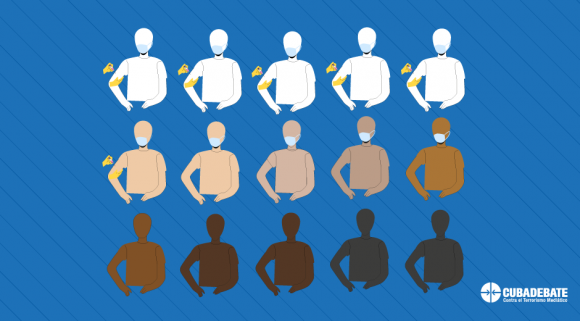
Despite numerous calls from the UN and various world leaders to seek a global response to the pandemic and to facilitate and share access to a cure for the disease, narrow views and deaf ears predominate.
“Science is succeeding, but solidarity is failing,” UN Secretary-General António Guterres noted on January 15. Several vaccines are already available worldwide to tackle the SARS-CoV-2 virus, but access to them is as deeply unequal as the world we inhabit.
Some 66.33 million doses have been administered to date, 93% of which were delivered in just 15 countries: the US, China, UK, Israel, United Arab Emirates, Germany, India, Italy, Turkey, Spain, France and Russia, according to the data analysis platform Our World in Data, based on figures from Oxford University.
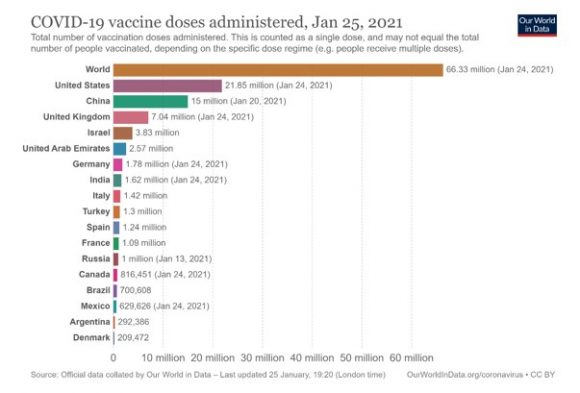
In all of sub-Saharan Africa, only 25 doses of vaccine could be administered in Guinea. Populous countries like Nigeria, with 200 million inhabitants, are waiting for the first dose.
The same scramble that took place at the beginning of the pandemic with lung ventilators, masks and protective suits is now being staged with vaccines: hoarding, overpricing and speculation. “An immoral race to the bottom,” as the WHO’s top executive described it.
The COVAX fund, created as a sort of global effort to make vaccines accessible to the poorest nations or those with limited resources, announced that in February it will begin to deliver the first doses (they first said that in January), but it recognizes that it has been limited by the lucrative agreements of various individual nations with the pharmaceutical companies that produce the anti-COVID vaccines.
Another handicap has been the high cost of the vaccines that have the most international approval so far. As Norwegian expert John-Arne Rottingen told The Guardian, “The difficulty is that we really only have widespread international approval for marketing two vaccines: the two mRNA vaccines. The challenge is that one, the Moderna vaccine is very expensive, and the other, the Pfizer / BioNTech vaccine, which was first available and is now being applied in Europe, is moderately expensive compared to others, and requires a super cold chain. The price and cold chain makes it not the ideal vaccines for a global vaccine.”
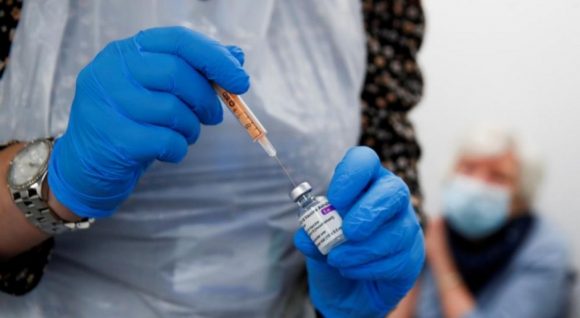
While nations like India and South Africa are calling on the WHO to campaign for pharmaceutical companies to relinquish intellectual property rights to COVID-19 vaccines and treatments. That would allow other qualified manufacturers in the South to expand production of those antidotes; countries like the US, UK and Canada have opposed the initiative. Those three wealthy nations have purchased or reserved enough doses to inoculate their populations at least four times.
High-income countries account for 16% of the world’s population, but hold more than 60% of the vaccines purchased so far.
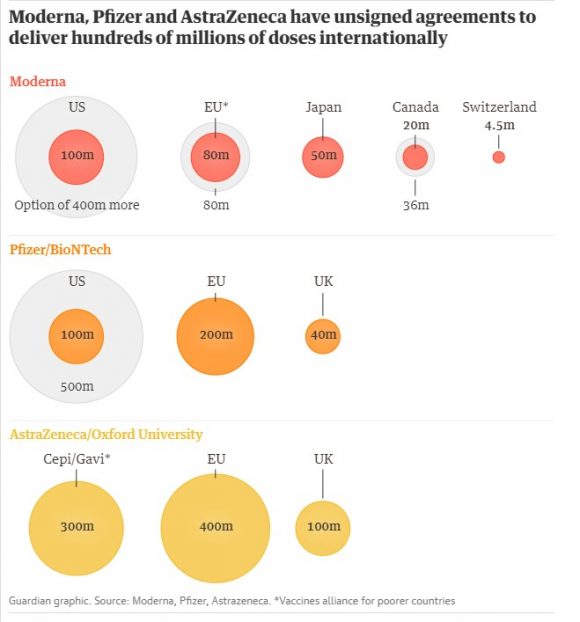
Rich countries account for the lion’s share of vaccine production. Graphic: The Guardian
Some forecasts put the total population of middle-income and poor countries that could be vaccinated this year at 27%. Duke University’s Center for Global Health Innovation estimates that there will not be enough vaccines to immunize the world’s population until at least 2023.
“The world is on the brink of a catastrophic moral failure, and the price of this failure will be paid in lives and livelihoods in the world’s poorest countries,” Dr. Tedros regretfully sentenced.
The virus of inequality
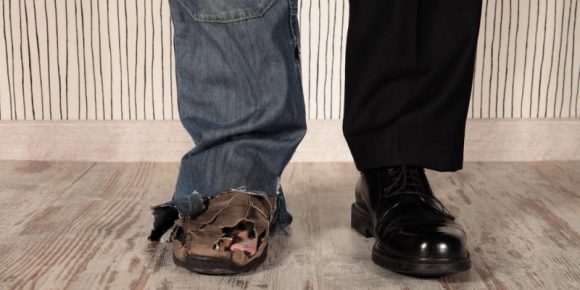
“Vaccine nationalism” is the exact reflection of an unequal and unjust world in which a few remain the great beneficiaries of wealth, for which billions must make do with the leftovers.
It is the “inequality virus” that OXFAM denounces in its most recent report, in which it evidences that the current failed economic system “allows a super-rich elite to continue to accumulate wealth in the midst of the greatest economic crisis since the Great Depression, while billions of people face great hardship to get by.”
While billionaires saw their fortunes increase between March and December 2020 by a total volume of $3.9 trillion-to amass an unimaginable $11.95 trillion-the poorest people on the planet will need “more than a decade to recover from the economic impacts of the crisis” accentuated by the COVID-19 pandemic.
Racial differences have also deepened. In the United States, the most powerful nation on the planet, if mortality rates were equal to those of the white population, nearly 22,000 Latinos and blacks would not have died from the coronavirus outbreak. In Brazil, people of African descent are 40% more likely to die from COVID than whites.
One of the conclusions of the Oxfam report is that “the pandemic is likely to increase inequality in a way never seen before”. The World Bank has warned that, in the current context, more than 100 million people could reach extreme poverty.
The 10 richest men in the world saw their net worth increase by $540 billion in the pandemic 2020 period. That list is topped by Jeff Bezos and Elon Musk. It also includes luxury group LVMH CEO Bernard Arnault, Bill Gates and Facebook CEO Mark Zuckerberg. According to Oxfam, the money hoarded by these potentates would be enough to prevent people from falling into poverty due to the effects of the virus and would also guarantee a vaccine for everyone on the planet.
Sunshine of the moral world
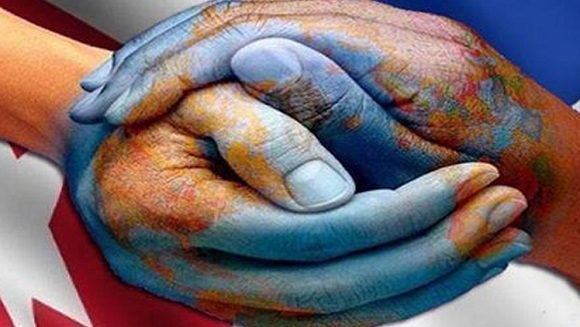
Among so much inequity and indifference, a small archipelago in the Caribbean, called Cuba, has been able to send thousands of doctors and nurses, in some 50 brigades of the “Henry Reeve” Internationalist Contingent, to more than thirty countries in Latin America and the Caribbean, Europe, Africa and the Middle East, to collaborate in the fight against the deadly disease.
Thousands of lives saved or recovered in a scenario of total complexity are the fruit of their solidarity work. The human and professional quality of these sons and daughters of the Cuban people overcomes the most diverse obstacles. It leaves a mark of affection, gratitude and example that is recognized by all those with whom they have shared and whom they have cared for.
That same country, with scarce economic resources but abundant in trained and educated talent, has been able to build an advanced biopharmaceutical industry, which is now preparing to produce 100 million doses of Soberana 02, one of the 4 vaccines on which its scientists are working. This would make it possible to immunize the entire Cuban population (it would be one of the first countries to achieve this) and to have more than 70 million doses available for other peoples of the South. There are already countries interested in acquiring it, such as Vietnam, Iran and Venezuela, Pakistan and India, the Director General of the Finlay Vaccine Institute recently announced.
Researchers from that institution are working with countries such as Italy and Canada to test the impact of the Soberana 01 vaccine on people who have already had COVID-19 and are convalescing, but are at risk of reinfection.
“We are not a multinational where (financial) return is the number one reason. We work the other way around, creating more health and return is a consequence, it is never going to be the priority,” Dr. Vicente Vérez, leader of the main vaccine research center in Cuba, explained to the press last week.
“Our world can only beat this virus one way: united,” the UN Secretary-General recently emphasized. Unfortunately, the vaccines of solidarity and justice have not been able to be applied in the rich world that dominates.
Subscribe to Blog via Email
| M | T | W | T | F | S | S |
|---|---|---|---|---|---|---|
| 1 | 2 | 3 | 4 | 5 | 6 | 7 |
| 8 | 9 | 10 | 11 | 12 | 13 | 14 |
| 15 | 16 | 17 | 18 | 19 | 20 | 21 |
| 22 | 23 | 24 | 25 | 26 | 27 | 28 |
| 29 | 30 | 31 | ||||

You must be logged in to post a comment.